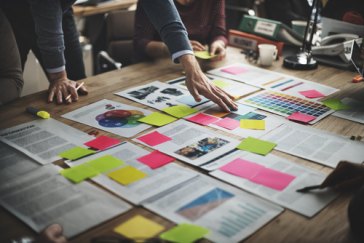Second Workshop of the “Eurasia Lab & Fellowship Program”: “Developing Project Ideas and Writing Funding Applications”

The year 2020 and the ongoing COVID-19 pandemic made one thing clear: collaboration, networking and the exchange of ideas and thoughts are core elements of research and scientific development. The “Eurasia Lab & Fellowship Program” came therefore at just the right time and seeks to find creative and effective ways to keep up collaboration and networking, especially for young researchers from Central Asia, the Southern Caucasus and Eastern Europe.
The second workshop of the “Eurasia Lab & Fellowship Program” on 26 November 2020 therefore took a similar hands-on approach as the first workshop one month before and addressed the topic of “Developing Project Ideas and Writing Funding Applications”. The virtual event brought together over 90 experts and researchers who are working in or on Central Asia, the Southern Caucasus and Eastern Europe to broaden their knowledge and skills about the development of research project ideas, building up a network of partner institutions, and the possibilities of applying for research funding.
In her input, Professor Dr Tanja Börzel from the Otto Suhr Institute of Political Science at the Freie Universität Berlin spoke about the “Dos and Don’ts of Writing Funding Applications”. She emphasized that the pandemic offered new opportunities, such as the unique chance to gather participants for a virtual event from so many different countries at once. In her very vivid presentation, she then shared her extensive experiences of having been both in the role of the applicant and in the role of being part of a selection committee of research grants.
She pointed out that one of the main challenges that the very diverse funding landscape poses was to find a successful match of the overall orientation of a grant on the one hand and the appropriate research focus and design on the other hand. She explained the differences in the funding landscape along four main dimensions: individual vs. collaborative research, basic vs. applied research, contract vs. programmatic vs. “free” research, and national vs. international funding. Furthermore, Professor Börzel spoke about the learning effects of collaborative research projects – as for instance facilitated by the EU research programme “Horizon 2020” – in terms of getting inspiration, learning from others, and the challenge to go beyond the personal comfort zone. And yet, she also claimed: “The chef cooks himself!” – meaning that it was crucial to never let anyone else write the application in the researcher’s name, but that he/she always has to be part of the writing process him-/herself. She also stressed to never underestimate the administrative work and challenges that come along with applying and managing grants.
In the second part of the experts’ inputs, Dunja Hofmann from the European Liaison Office of the German Research Organisations (KoWi), Dr Kirsten Kienzler from the DLR Project Management Agency, and Dr Matthias Nöllenburg from the Volkswagen Foundation presented funding instruments provided by their institutes specifically for research projects in Central Asia, the Southern Caucasus and Eastern Europe. One of the main take-aways for the participants was that while funding on the EU-level requires a transnational research network and team, it is also very often connected to the requirement of the location of the host institute to be located within the European Union or a specific EU member state – one more reason why transnational networking is of such importance.
During the Q&A session, the experts discussed the different stages of building a research career, the advantages and disadvantages of interdisciplinarity and mono-disciplinary approaches in research projects, as well as the question on how to position research projects on a spectrum of incremental research versus ground-breaking research and how to find the suitable funding schemes for this with participants.
At the end of the event, the participants switched to the online platform “Wonder”. The platform allowed every participant to freely move around a virtual room and to engage in either group discussions or individual conversations. According to the participants’ overall very positive feedback, “Wonder” provided an exciting and interactive format and allowed personal and informal exchange after professional events which in course of the COVID-19 pandemic unfortunately had become rather rare this year. The participants used this opportunity to ask more specific personal and career-related questions and to discuss research ideas and funding options with the experts. It also facilitated networking among participants and helped them to either get back in touch with partners or exchange contacts for future collaboration. And eventually it contributed to one of the key aspects that Professor Börzel had tirelessly emphasized: communication, cooperation, and gaining multiple perspectives are the key for successful research!
Author: Friederike Augustin
The workshop took place within the framework of the “Eurasia Lab & Fellowship Program” which is supported by the Open Society Foundations (OSF). The opinions expressed by the project and its publications may not reflect OSF’s views.